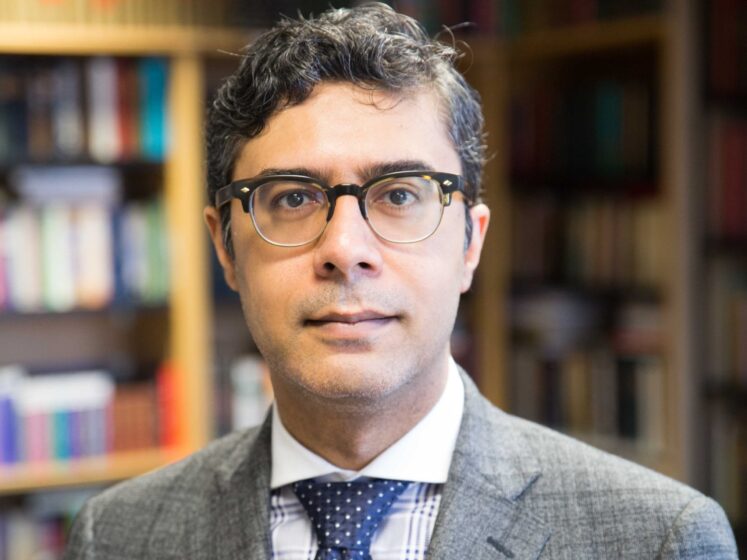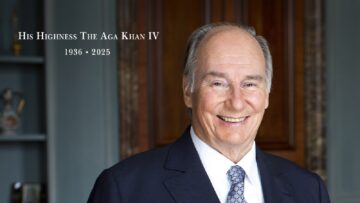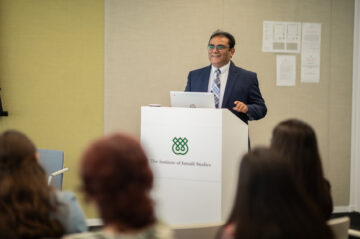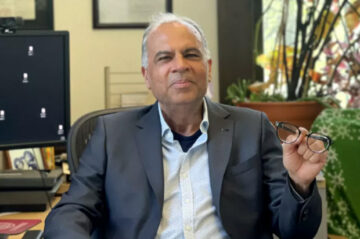Zulfiqar Khimani has recently been promoted to Manager for Educational Programmes in the Department of Community Relations. He also undertakes academic work and teaches on the GPISH programme. Here he talks about his new role, his plans for the unit and what he values most about working at the IIS.
What does your role entail and what are your key responsibilities?
The Department of Community Relations (DCR) is a unique department in that it deals with the global Ismaili community and its leadership. Within the department, there are several units, one of which is the Educational Programmes Unit (EPU). The responsibility of this unit is to manage educational and academic programmes at the diploma and certificate level related to various Ismaili community constituencies. In short, the Educational Programme Manager is a critical leadership role that develops and implements programmes and provides educational materials around areas that the Ismaili community deems important.
In the EPU, we are currently running eight short courses, which are for adults in the Ismaili community who want to improve their understanding on various subjects in the field of Islamic Studies. The other programmes we run are focused on leadership education, including the ITREB Members Training Programme. We also run the Postgraduate Research Fellowship Programme (PGRF), which aims to support IIS graduates working in ITREBs who are theoretically grounded in social sciences and humanities but may not be as conversant in operating in community institutions.
The EPU, in a way, responds to the question of what the IIS is doing for the general Ismaili community. My role is to observe what is happening all around the IIS—cutting-edge research work produced by IIS scholars—and, from that, work with my team to extrapolate and extract ideas that can be useful for three major constituencies: the general Ismaili community, Ismaili community leadership, and academically oriented audiences, mainly ITREB professionals and IIS graduates who participate in some of the EPU’s academically oriented programmes such as PGRF. So, in a way, it mirrors the IIS: at one end, it is an academic institution, and at the other, it is an Ismaili community institution, and that combination is reflected in action through the work of the EPU.
What are your top three priorities for the unit?
When I joined the IIS in early 2015, we were only offering one short course, which was a precursor of the short course on Islam. The idea was to increase the offer for adult learners, and we have already achieved that milestone. My priority now is to expand the short course portfolio, depending on the capacity, but more importantly, work towards accreditation and quality assurance of the short courses offered by the EPU. Our unit is working closely with Dr Tullio Lobetti’s Quality Assurance and Evaluation team to achieve this goal.
My second priority is to create some MOOC style courses. After Covid, we have all witnessed how important the digital spectrum has become. In the unit, we’re currently running many online synchronous courses, where everyone joins at a particular time to participate in the programme. But my future goal is to introduce courses that can be done asynchronously, where people can do the required learning independently and at their own pace.
The third priority is to provide support to ITREB in terms of their human resource capacity development. We want to strengthen what we have already started in the PGRF pilot project and plan to run it again in 2022. It’s a big programme—30-40 faculty are involved in its delivery—and we want to operate at a level where it can be accredited by external authorities or by the IIS when it becomes a degree-granting institution in the future.
What exciting projects do you have in the pipeline in 2021-22?
So, as I said, one is to start the second cycle of PGRF based on the learnings we gained from the pilot project. Dr Farouk Mitha is working with us on this project as a Course Director, developing course work and supporting us in programme planning. It’s a unique course because it’s academically intensive, but at the same time it attempts to provide language and articulation that will be contextually appropriate and provide comfort for a culturally diverse Ismaili community. PGRF provides the lens of how to operate in a faith community context, which is not really available in any degree programmes around the world, because these operate on purely academic terms. Empathy towards the normative directions of a community is often missing from university graduate programmes, so through PGRF we are trying to bridge that gap. There’s a lot of opportunity for improvement and creativity, so I’m really excited and looking forward to that in 2022.
I’m also hoping that in 2022 we will be able to resume some of the short courses face to face—particularly the short courses focusing on Ismaili heritage. In the past, we travelled to Tunisia and Cairo to walk through Ismaili Muslim heritage and experience Muslim civilisation first hand. These programmes are exciting, and I’m really looking forward to these short courses coming into play again, face to face.
The planning of the short MOOC will also be exciting, but the fruits of that planning will emerge in 2023 probably.
What do you value most about working at the IIS?
I value the IIS because it allows people to grow in terms of academic scholarship. You have a lot of freedom, so for me, that means I’m not just doing managerial work, but I’m able to engage in academic work as well.
The second is the opportunity to interact with a diverse and wide variety of people. You rarely find in organisations where so many different languages and cultures are present, everyone ready to interact and talk about what they are working on and how their scholarship could benefit a larger audience. In other corporate sectors certainly, you will see different kinds of cultures, but people’s culture does not necessarily become part of their day-to-day working routine. But here, we encourage people’s culture to be part of and visible within the work of the institution, and I think that is something I really cherish about the IIS.
The third aspect is how the IIS is involved in developing human resource capacity and providing channels for that human resource to work within the Ismaili Imamat institutions. I’m a product of the IIS because I’ve done GPISH, then went on to work with the Aga Khan Development Network (AKDNThe Aga Khan Development Network (AKDN) is a contemporary endeavour of the Ismaili Imamat to realise the ethics and social conscience of Islam through institutional action. More) in the Quality of Life Assessment Programme, but eventually came back to the IIS because it allowed me that space to grow. So there is a kind of value incentive there. The IIS values its own graduates to come back to the Institute and work for it.







